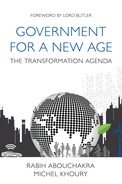Foreword
Throughout my career as a civil servant, I found myself endlessly excited by the sheer variety of the work and the challenges of government. In the British government, ministers receive documents in red boxes; as Cabinet Secretary and Head of the Civil Service, my papers came in a black box. When they were delivered to me I always felt a feeling of anticipatory excitement about their contents. Margaret Thatcher, one of five British prime ministers I worked alongside, was once asked whether she was ever fed up by the arrival of yet another red box. She replied that the time to be fed up was when the boxes stopped arriving.
These days, for all those involved in government, the contents of those official boxes are heavier and the scope of their contents much broader. Government, as a politician or as a civil servant, is unquestionably more demanding than ever before.
Moreover, as Rabih Abouchakra and Michel Khoury persuasively point out in Government for a New Age, it is also fast changing. I served the British government for four decades, but the governmental challenges and machinery of today are far, far different.
Change is, of course, inevitable. Earlier in my career there was a senior civil servant called Sir Matthew Stevenson. He was pushing some changes through and one of his colleagues objected that if they went ahead life would never be the same again. ‘Life does change, but that’s what distinguishes it from death,’ noted Sir Matthew.
In twenty-first-century government, change is manifest in two main ways. First, governments of our time are faced with an unprecedented flow of information. Once the flow of facts was finite. No longer. Governments face an infinite welter of information which needs to be absorbed, managed, filtered, prioritized and acted on. Second, global connectedness brings commercial and other advantages. But it also means that local issues and problems can quickly become blown into global incidents. In addition, it means that the power of national governments acting alone has declined.
Unquestionably, globalization and technology are powerful and largely positive forces. But, also unquestionably, they raise a whole host of difficult issues – not least individual privacy and national security – which governments throughout the world are wrestling with.
To harness the forces changing the shape and practice of government in the best possible way it is worth reminding ourselves of the fundamentals of the roles of government and those who exercise them.
I have always thought that the primary role of government is to set a framework. Inside that framework power should be devolved as close to those in the front line as possible. Government requires delegation.
Often, unfortunately, governments cannot resist the temptation to pass law after law. These are often no more than reactions. The profusion of hasty, short-term laws threatens to bring the law itself into disrepute.
In addition, governments must provide infrastructure for citizens, provide them with the services they require and protect their rights. Again, technology and the global flow of information have a huge influence here as governments seek to gather and utilize information while balancing this with individual rights to privacy.
To be effective, governments need to operate at two levels. They must be able to deal with the day-to-day demands of events and also with the media agenda. But they must also possess the ability to deal with the real business of government. No modern government can ignore the demands of the media, but nor can they overlook their longer-term responsibilities to create a robust framework of governance and to meet the needs of their citizens.
As with so many aspects of government explored in this book, there is a constant need for balance. The executive and parliament have to work in tandem in a balanced way. If power shifts one way or another it may create problems.
In the UK I am involved with the Better Government Initiative (www.bettergovernmentinitiative.co.uk). It argues that better government is based on five broad foundations: a robust policymaking process; open and transparent government; simple legislation responding to clearly identified needs; effective accountability of government; and an impartial, diverse and professional civil service.
These and other important issues at the heart of government are tackled by Rabih Abouchakra and Michel Khoury in Government for a New Age. The governments which grasp the nettle and join the debate about the future nature and purpose of government are playing for a big prize.
The end result of effective government cannot be measured simply in economic terms. It needs to be measured in terms of the well-being of citizens as well as GDP (a cause championed by one of my successors at the Cabinet Office, Sir Gus O’Donnell).
Good government matters. It will play a vital role in creating a better world.
Robin Butler, Baron Butler of Brockwell,
London, July 2014
